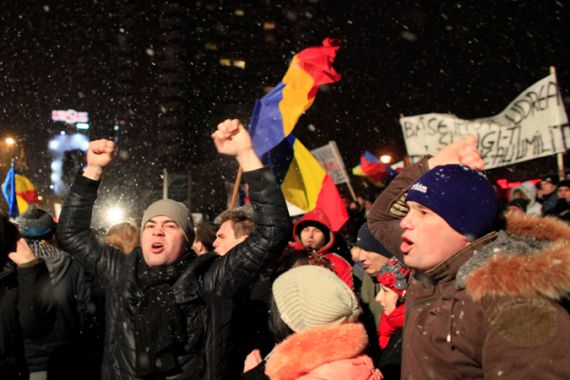Romania’s PM warns protesters on fifth day
Emile Boc says violence will not be tolerated as demonstrations against budget cuts continue in the capital, Bucharest.

 |
| Protesters waved Romanian flags with holes in them, symbolising the 1989 anti-communist revolution [Reuters] |
Romania’s prime minister has given warning to protesters demonstrating against government austerity plans that violence will not be tolerated.
Speaking on the fifth day of demonstrations in the capital, Bucharest, on Monday, Emile Boc, the prime minister, said violent clashes would jeopardise stability and economic growth.
Nearly 60 people were injured over the weekend during scuffles with police.
“We have achieved stability but we cannot harvest the fruits immediately,” Boc said in his first speech since the protests began.
“My message is clear: violence will not be tolerated, peaceful protests are legitimate. Street violence can do us much harm and can hamper prospects for economic growth.”
Boc’s message came as more than 1,000 people braved freezing temperatures to rally in central Bucharest on Monday, chanting “Freedom” and waving banners that read: “Hunger and poverty have gripped Romania”.
Smaller protests also took place in nearly 12 other Romanian cities.
People of all ages
Al Jazeera’s Nick Spicer, reporting from Bucharest on Monday, said the protests have brought people of all ages to the streets.
“It’s safe to say there’s a broad cross-section of society joining these protests although they are not really numbering in the tens of thousands at this point,” he said.
“There is about 8,000 nationwide at this point.”
The protests are the most serious since President Traian Basescu came to power in 2004 and are the result of pent-up frustration against public wage cuts, slashed benefits, higher taxes and widespread corruption.
|
The protests in Romania turned violent over the weekend [Al Jazeera] |
In 2009, Romania took a two-year $27.5bn (20bn euro) loan from the International Monetary Fund, the European Union and the World Bank, as its economy shrank by 7.1 per cent.
Romania imposed harsh austerity measures under the agreement, reducing public wages by 25 per cent and increasing taxes.
The catalyst for the protests, however, was the resignation of Raed Arafat, a popular health official, on Tuesday after he opposed health reforms that the government had proposed.
Arafat, a Palestinian-born doctor, was forced to resign after a row with Basescu over controversial health reform proposals.
Basescu told the government on Friday to scrap the reforms, but public anger had already risen against Basescu and the government.
Protesters staged smaller anti-government rallies on Saturday in the Romanian cities of Timisoara, Constanta, Craiova and Cluj and in other smaller cities.
One retired woman, Rodica Patran, said she objected to a pension freeze and a 25 per cent cut in public wages adopted by the centre-right government in July 2010.
“We can no longer stand the poverty, enough is enough.”